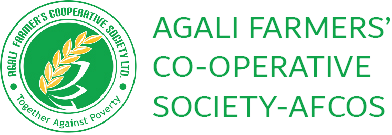Overview
Agali Farmers’ Cooperative Society Limited (AFCSL) is a farmer-led social organization registered under The Co-operative Societies Act, Cap 112, with number P.7724/RCS, as a multi-purpose co-operative to engage in crop production and processing, agro-input selling, among other activities that may be added depending on general meeting decision, in accordance with the society’s bye-laws 2013
Agali Farmers’ Cooperative Society Limited started operating in Ocamonyang, Agali Sub-County Lira, by mobilizing farmers for basic peer skills and knowledge sharing on how to save and to make innovative products in agriculture investments and guiding them on forming Self Help Groups (SHGs) through which they would raise incomes to improve on their livelihoods. Currently, we operate in areas of following districts Lira with our total membership and parts of Apac, Kole, Oyam, Dokolo, Alebtong, and Amolatar as members but also business networking and we also hope to launch future branches for the cooperative as expansion. There are about 98 farmer groups with 2500 active members out of 5000 mobilized so far dealing in the production and marketing of Sunflower as the main enterprise and other crops like white & red sorghum, Maize, Soybeans, and Cassava
Mission
To empower farmers through sustainable agricultural practices, knowledge sharing, and cooperative principles, with a focus on crop production and processing, agro-input selling, and promoting socio-economic development in the farming communities.
Vision
To be a leading farmers' cooperative society that transforms agricultural practices enhances farmers' livelihoods, and contributes to food security and economic growth in the region.
Objective
This objective aims to enhance agricultural productivity and profitability by equipping farmers with the knowledge and resources necessary to adopt modern farming technologies and techniques. By achieving this objective, the cooperative society can help farmers overcome challenges related to outdated practices, low yields, and inefficient resource utilization
Opportunities Adressed
- Expansion of Farmer Engagement: We have successfully engaged over 5000 farmers in the crop value chain production. This presents a significant opportunity to scale up our operations and increase the impact of our cooperative society. By involving a large number of farmers, we can collectively contribute to the growth of the agricultural sector and improve the livelihoods of a substantial population.
- Harvest and Supply Potential: With an impressive harvest of over 5000 metric tons of sunflowers, we have demonstrated our capacity to produce agricultural commodities in substantial quantities. This achievement positions us well to fulfill contractual agreements with high-volume market demands. We have secured valuable market connections and are ready to meet the supply needs, ensuring a steady and reliable income source for our farmer members.
- Effective Management Model and Land Availability: Our cooperative society is backed by a robust and efficient management model that enables the smooth implementation of our programs. Moreover, we have ensured access to sufficient land resources for our farming activities. This combination of effective management and ample land availability provides a solid foundation for our cooperative's growth and success.
- Knowledge Empowerment: We have made significant progress in empowering our farmers by equipping them with basic agronomy practice knowledge in crops like maize. This knowledge enhancement enables our farmers to make informed decisions, adopt improved farming techniques, and enhance their productivity. By continually investing in knowledge sharing and capacity building, we can uplift the farming community as a whole.
- Supportive Local Government: The Lira local government has expressed willingness to collaborate with Agali and neighboring districts. This support provides us with an excellent opportunity to leverage local government resources, expertise, and networks to further enhance our cooperative's impact. Collaborative efforts with the government can lead to shared resources, policy advocacy, and access to additional funding opportunities, contributing to the overall growth of the agricultural sector.
- Addressing Unemployment: By engaging a high number of farmers and promoting agricultural activities, we are actively contributing to reducing unemployment rates in the region. Farming provides employment opportunities across various stages of the crop value chain, including cultivation, harvesting, processing, and marketing. Our cooperative society serves as a catalyst for job creation and economic empowerment, positively impacting the local community.
Achievements Todate
There are already about 5000 farmers database registered with over 2500 actively engaged in productive work producing between 2000 – 7000 metric tons preseason. The organization is already registered at the national level, working with development partners like GIZ, UBL, Agro-tourism, NBL, Mukwano group of Companies, Agro-ways, and buyers from Kenya and South Sudan. Districts local government. Have at list supplied different produce like 2500 metric tons sorghum to Nile breweries, soy and sunflower to Mukwonago, cassava to UBL, and began engagement with WFP.
Challenges Remaining
There are limited funds to facilitate the value chain activities, poor community infrastructures like roads, phone networks for communications, unfavorable conditions mostly longer drought spells, lack of storage facilities and post-harvest handling facilities, access to quality inputs for high production, theft of grains and products, no value addition to products fetching low incomes.
Sustainability Issues
The organization has the best cooperative model it's following to run most of its activities engaging with the most important stakeholders on the platform. Growing crops at different rates to sustain the supply chain and shift mobilization of members. Have stakeholders from inputs to outputs. Have and continue with the training of members and stakeholders in knowledge needed to produce and manage different activities along different value chains.



